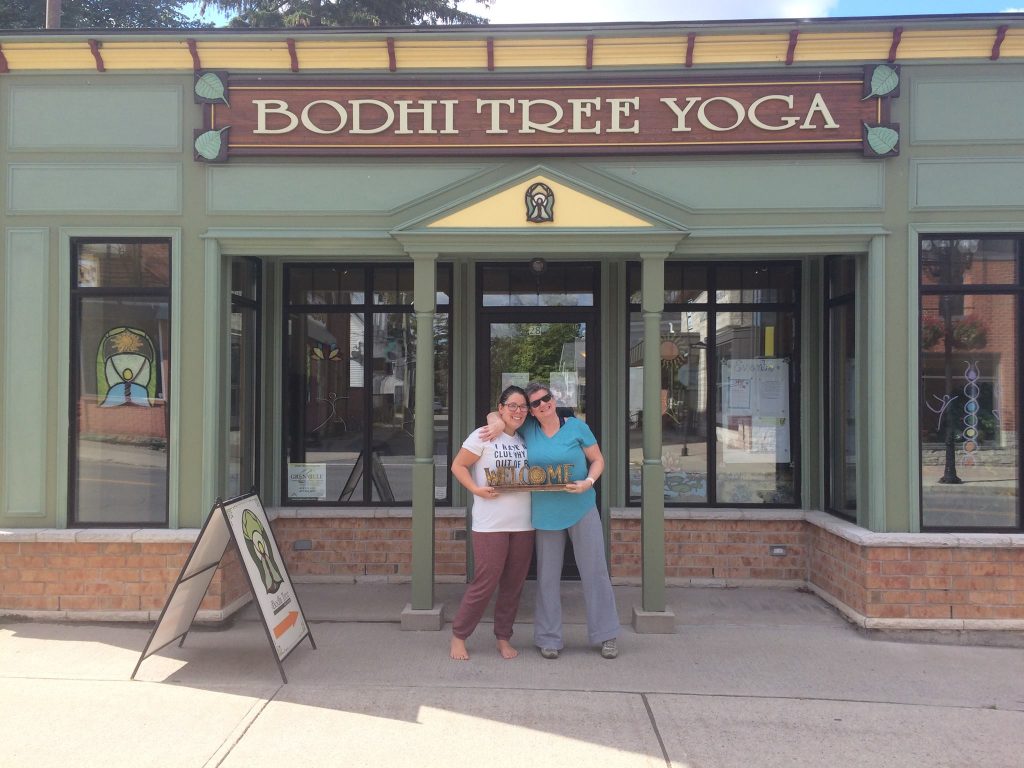
Bodhi Tree Yoga Studio finds its own way through online presence
Melanie Charlebois (who goes by her yogi name Om Shanti) was in a remote part of Nepal with her brother and a few friends when the pandemic started to escalate in March 2020. It was meant to be a two-week trip while her Bodhi Tree Yoga Studio continued as usual back in Kemptville.
“Over the course of the next couple of days, everything just started cascading,” says Om Shanti. “And the problem is, when you’re in Nepal, you’re about 12 hours away and I think it was an 11 hour time difference.” She also had very limited access to the internet. “So as a business owner being away, I was receiving information from random people back in Canada telling me how I had to close my business,” she recalls. “Some comments were a little bit of a personal attack, things like you're being heartless (by staying open)… but you have to understand, I had no internet connectivity, I'm 12 hours away and where I was standing in my part of the world at that time, there was no pandemic.”
It felt like an impossible situation to make unprecedented decisions about her business. Finally, after speaking with a trusted friend who owns a fitness business just down the street from Bodhi Tree, she realized what she needed to do. “When I heard from her that she was closing her doors, I made the call to close my doors from Nepal,” she says.
It was a saga to make her way back to Canada and by the time she’d returned, the world was a very different place and the state of the studio she’d spent four years building was up in the air. Between travel and isolating, the doors to the business had been closed almost a month before Om Shanti was able to set foot inside of it. It was a space she’d loved and been a part of for 11 years and now she was in a position when she couldn’t have a relationship with that space.
“I actually called it, at one point, the sacred pause,” she says. “I figured this is just where we’re going to be and we should embrace it.” But in that stillness, Om Shanti came up with a way forward. The business’ streetside entrance allowed it to have shoppers in. She saw that as an opportunity to draw some sort of revenue and started sourcing products from businesses that aligned with her values to sell in store.
“It was beautiful to watch it all come together and at the same time, it gave my studio the opportunity to be open and for people to come in and do some shopping, but also talk about, (how they) can’t wait to come back to yoga,” she says.
Om Shanti admits that teaching virtual classes is a tough sell for her as a business owner. She is insured to teach online but getting her instructors insured would be costly. Instead, she’s focused on keeping the community together through smaller class sizes.
In 2019, the studio received training and a $2,500 grant from Digital Main Street, a program combining grants and one-to-one support from the Province of Ontario alongside partners like Google to help main street businesses strengthen their online capabilities and plan for the digital future. It helped her recover some of the costs of investing in Mind Body Online, an online booking and registration service.
The digital platform has been a critical tool for creating waitlists and managing cancellations as well as booking classes. “This was actually a really eye-opening experience for me,” she says. Prior to that they’d operated on a drop-in “there’s always room for one more” sort of model. “When we did reopen, all of our classes filled almost immediately and we spent the next five months operating anywhere from 80 to 95 per cent capacity, which is absolutely incredible,” she says. “We have never operated in that type of capacity in the 14 years that the studio has been open… it really showed a shift in the way that we needed to operate in order to stay afloat.”
The platform allows the studio’s clients to buy packages and book classes in advance, making sure they’re getting into the ones they like. She also received a second Digital Main Street digital transformation grant which she’s used to help invest in Later, an Instagram scheduling tool. “I have to create curriculums and teach teacher training programs and classes and (be) available for people at any given time, so I can’t spend too much time in the digital world,” she says. The scheduling platform allows her to prepare posts in advance and keep active on social media while focusing on the other parts of the business.
With help from the grants, Om Shanti says they’re able to develop a stronger presence. “I think that has something to do with being open for these last four months and really building our voice in the way that we were hoping to build it,” she says. “(We’re) finding our own way.”
Written by Andrew Seale
Digital Main Street a été créé par la Toronto Association of Business Improvement Areas (TABIA) avec le soutien direct de la Ville de Toronto. DMS est également soutenu par un groupe de partenaires commerciaux stratégiques, dont Google, Mastercard, Shopify, Meta, Intuit QuickBooks, Square, Lightspeed, Ebay et Postes Canada.
A $42.5-million investment from FedDev Ontario brought together the Toronto Association of Business Improvement Areas, Communitech, Invest Ottawa and the Ontario Business Improvement Area Association to expand the Digital Main Street Platform in order to support more businesses going digital as a response to the impacts of COVID-19 in Southern Ontario.
